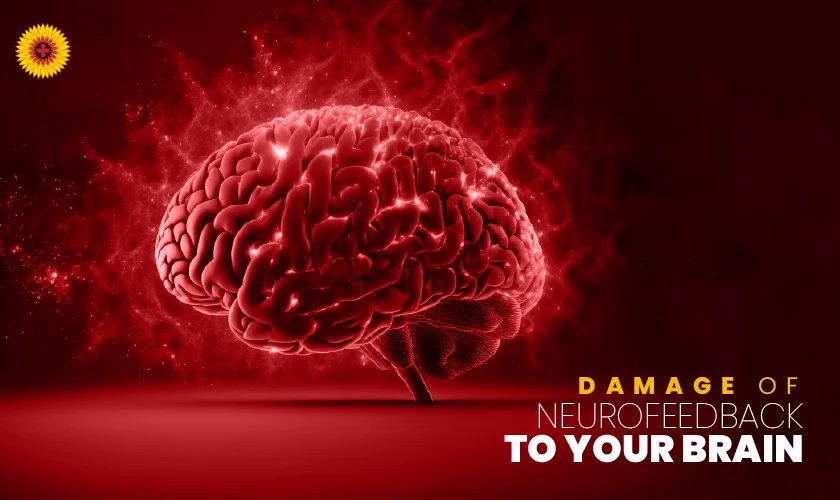Neurofeedback is a type of brain training that has become increasingly popular recently. It involves using technology to monitor brain activity and provide feedback to help individuals learn how to control their brainwaves. Try our neurofeedback service.
This blog post will explore neurofeedback, its potential benefits, and risks, and whether it can cause brain damage. Keep reading to learn more.
What is Neurofeedback?
Neurofeedback is a type of biofeedback that focuses specifically on brain activity. It involves placing electrodes on the scalp to measure brainwaves and displaying this information on a computer screen in real-time.
People can then use this feedback to learn how to control their brain activity and achieve a desired state, such as relaxation or focus.
Neurofeedback works on the principle of operant conditioning. When people produce the desired brainwave pattern, they receive positive feedback through a visual or auditory signal. Over time, they learn to associate this feedback with the desired state and can produce it more easily.
There are several different types of neurofeedback, including EEG (Electroencephalogram), HEG (Hemoencephalography), fMRI (Functional Magnetic Resonance Imaging), and more. Each type uses a slightly different technology and measures different aspects of brain activity.
Benefits of Neurofeedback
Let’s discuss some benefits of neurofeedback:
- Neurofeedback has been touted as a promising treatment for various conditions, including anxiety and depression, autism, ADHD, and PTSD.
- Some studies have suggested that it improves cognitive function and enhances athletic performance.
- One of the key benefits of neurofeedback is that it is non-invasive and does not involve medication.
- It can also be customized to target specific areas of the brain or brainwave patterns, making it a potentially more targeted treatment than medication.
Risks and Side Effects of Neurofeedback
Let’s discuss some side effects a patient might experience during or after a neurofeedback session. These side effects usually go away shortly. Let’s go over them one by one:
- There’s fatigue. This can happen because your brain waves are speeding up or slowing down, but it doesn’t last long and tends to go away after a few sessions. Sometimes, people might feel super tired and take a long nap afterward, but that can be a good sign that their brain is resetting.
- If you have a previously existent neurological condition, it may result in some side effects. Tell your doctor about any condition you might have had before.
- Headaches can occur if we’re training the wrong areas or using too much pressure on our cap.
- Head pressure is a rare side effect, but it can happen when training a specific section of our brain. This feeling usually doesn’t last long and shouldn’t be a problem.
- Low energy might be a side effect for people who are usually high-energy and undergoing treatment to reduce hyperactivity. It’s a positive sign that the therapy is working and adjusting their activity levels normally.
- Muscle tension is another side effect that can happen if the therapy isn’t administered correctly, especially when we’re training the higher frequencies.
- Anxiety can happen because of the electrodes or general nervousness before a medical procedure. It can also persist after the session, but that should go away as you continue the therapy.
- Patients may feel brain fog and difficulty focusing during and after the session if the practitioner lacks sufficient training.
- Neurofeedback is highly successful for depression, but increasing slower brain waves may cause depression in previously unaffected clients.
- Dizziness may occur during and after the session due to changes in brain wave patterns. Some people may experience panic or claustrophobia during training, which should be reported to the monitor during the session.
Can Neurofeedback Damage Your Brain?
So, can neurofeedback cause brain damage? The short answer is that there is no evidence to suggest that it can. While there are risks and downsides, no research suggests that neurofeedback can cause brain damage or other serious side effects.
It’s important to note that not all practitioners may be equally qualified or experienced in providing neurofeedback. To ensure you receive the best and safest treatment, it’s important to research and consult with a licensed and experienced practitioner before trying it.
Conclusion
Is neurofeedback safe? It is considered a safe and promising treatment for various conditions but has a few temporary/short-lived side effects.
There is no evidence to suggest neurofeedback can cause brain damage. Still, it’s important to consult a qualified doctor/therapist and do your own thorough research to learn if you’re comfortable undergoing it.
Neurofeedback should not be used as a replacement for traditional medical treatment. Get professional medical advice if you are experiencing symptoms of mental health conditions or another medical issue.
Neurofeedback is a relatively safe and non-invasive treatment option for individuals interested in improving their cognitive function or managing symptoms of a mental health condition.
If you’re curious to learn more and want a professional’s opinion, feel free to reach us at Urgent Care of Kansas, we will be glad to help.



No comment